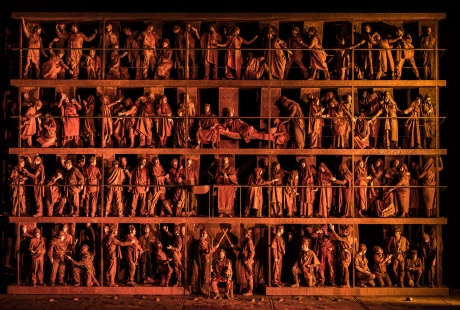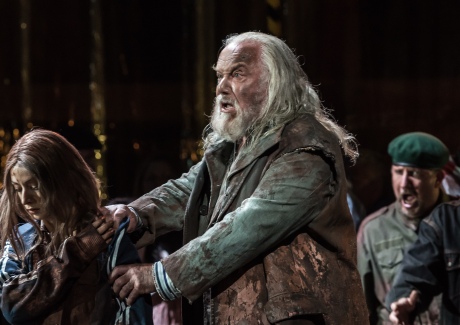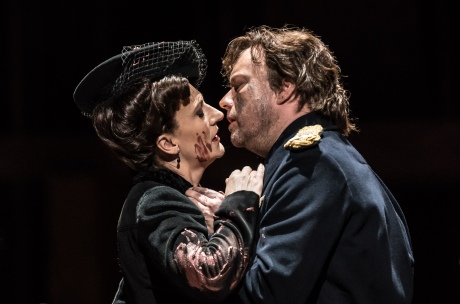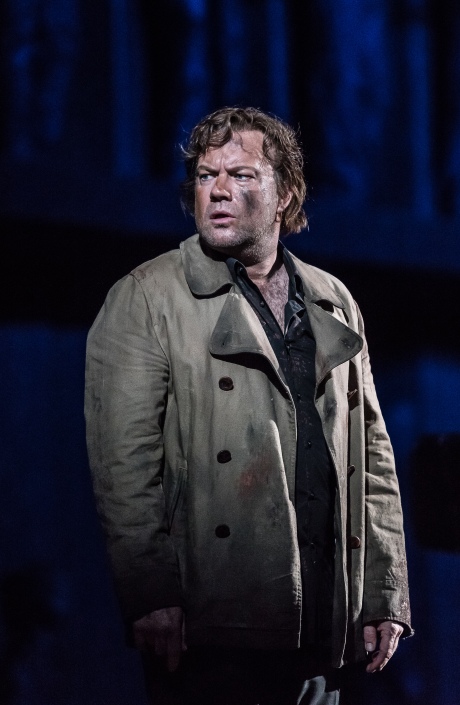George Enescu’s only opera makes its much-delayed Covent Garden debut in a daring production from Àlex Ollé (of La Fura dels Baus) and Valentina Carrasco. Enescu and his librettist, Edmond Fleg, take a narrative approach to the legend, from Oedipus’ birth right up to his death. Ollé and Carrasco break up that linearity by moving between eras from scene to scene, visiting classical Greece, the early 20th century and the modern day. It’s a daring approach, but it rarely distracts. The production is supported by excellent musical performances, from the orchestra, chorus and the large cast, all skilfully co-ordinated by conductor Leo Hussain. The result is a demanding, often harrowing, evening of opera, but one that makes an excellent case for this underrated work.

Enescu spent over 20 years on Oedipe, and that dedication is evident in both the quantity and the continuous invention of the music. A large orchestra is employed, creating a soundworld that is often bass heavy and generally woodwind dominated. But an array of keyboard instruments and unturned percussion are prominent too, often producing beguiling, atmospheric textures and powerful, incisive climaxes. The pace of the narrative is steady, and Enescu often dwells on moments of high emotion or suspends the discourse for interludes of orchestral reflection. As a result, the opera always feels very human, and certainly very remote from the austere ritual of Stravinsky’s contemporaneous treatment and the later operatic versions it influenced.
Ollé and Carrasco balance that realism with a staging that emphasises the passing of time. There are two 20 year gaps in the story, between the first and second acts and between the second and third, and in this production, we are keenly aware of that passing time. The large chorus is often dressed in terracotta hues, and similarly coloured life-sized statues are ever present on the stage. According to the programme, the intention here is to emphasise that Oedipus himself stands outside time – we all age but he remains.

The sets, by Alfons Flores, are framed by a four-story arcade in square formation around the back and sides of the stage. The rear section is brought to the front at the start and populated with chorus members posed to resemble a fresco or bas-relief. Against this, the story of Oedipus’ birth is told. This opening act is dominated by an impressive cameo from Sir John Tomlinson as the blind prophet Tirésias. Much of the tone and weight that made Tomlinson’s voice so distinctive is now gone, but that’s no disadvantage in this role, and his ability to dominate the stage is as keen as ever. Tirésias pronounces the gods’ curse on Oedipus (who at this stage is represented by an unconvincing plastic baby – shades of Jenůfa there) and he is handed over to a shepherd, the ever-dependable Alan Oke.
Sadly, Enescu doesn’t always provide enough scene change music for the complex logistics that Flores’ sets require, and between Acts I and II we sat in silence while the entire chorus descended from the arcade down a single set of noisy steps. After which, we found ourselves 20 years later in Corinth … or rather in a psychiatrist’s office, chaise lounge and all. But this proved a suitable format for the discourse between Oedipe and his adoptive mother, Mérope, sung here with controlled elegance by Claudia Huckle. Next to the crossroads, where Oedipus kills his father. Surprisingly, Enescu doesn’t make much of this scene, but Ollé and Carrasco chose to present it at a modern-day road works, flashing lights, traffic cones and all. Then to the Sphinx, who inhabits a crashed Second World War fighter plane. Marie-Nicole Lemieux hams this role up, but it works well, here maniacal laughter at Oedipus’ apparent victory a telling foretaste of the implications.

After the interval we reach the plague at Thebes, and the start of Sophocles’ drama proper (only broad model the libretto in any case). This third act is the heart of the opera, and Enescu gives it his very best. Sarah Connolly gives a gripping performance here as Jocaste, an unnerving and increasingly fraught presence. The chorus too are on top form in this act. The choral writing throughout is complex and demanding, leading to some occasional poor ensemble in the first act. But by this point the chorus had found their form, adding thrilling volume and power to the drama. Thankfully, Jocaste’s suicide and Oedipus’ putting out his eyes both take place off-stage, but even without the physical violence, everything here is visceral and immediate.
Johann Reuter as Oedipe is the presence that runs through this opera. The cast is huge, but almost every other singer makes only brief appearances. Reuter, on the other hand, sings almost continuously from the opening of the second act to the end. His gives his best in the final act. The setting here, a grove near Athens, is represented by a crowd of terracotta figures all gradually emerging from the earth. Oedipus is banished from Thebes and has spent years wandering the country, guided by his daughter Antigone, sung by the excellent Sophie Bevan, she too alas in no more than a cameo. The Thebans, led by Créon (Samuel Youn – who has sounded deeper and richer in the past, but was more than adequate for this part) try to coerce him back, but are prevented by the Athenians, presented as guardian angels in white suits. Oedipus justifies his previous actions as preordained by fate and departs, delivered up to the gods. Enescu takes his time over these last rites, but Reuter justifies the slow pace of the narrative with impressively emotive but controlled singing, and still sounding as fresh as ever, even after the huge demands of the earlier acts.

Practicalities alone may account for the previous neglect of Oedipe. The orchestral requirements border on the unfeasible and, more significantly, a large cast of excellent singers must be assembled, even though most of the roles are very small. But it is a work of real dramatic power, more traditional in its narrative approach than in its music, which is mostly at the Expressionist end of the post-Romantic spectrum. The staging (which is a co-production with La Monnaie and Paris Opéra – it has already been seen in Brussels) is conceptually complex, but mostly successful in its ideas. Visually, there are a few clichés, we’ve seen the fighter plane before, and the manner of Oedipus’ departure is all too familiar. But the overall impression is of a spectacularly inventive score, presented in a production that keeps pace with its every twist and turn, and offers a level of psychological sophistication to match everything we find in the music.
This production will be broadcast on BBC Radio 3 on 4 June at 7:15 pm.
4 stars
Gavin Dixon
(Photos : Clive Barda)